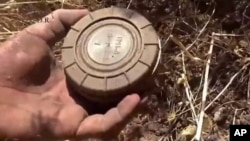Once the fighting ends, peace treaties are signed, and armies are disbanded, we assume that life in former conflict areas will soon return to normal. But that’s hardly the end of the story. Too often, former battlefields and contested towns are strewn with dangerous war materiel that when unaddressed can cause damage for years to come. Unexploded ordnance and landmines render thousands of hectares of land unusable and destabilize communities.
“Since 1993, the United States has invested more than 2.6 billion dollars to clear or destroy landmines, unexploded ordnance, and other dangerous conventional weapons and munitions. We’ve done this in more than 95 countries. We are helping post-conflict communities to recover and to rebuild,” said Thomas Countryman, Acting Under-Secretary for Arms Control and International Security. He spoke at the November 17th release of the annual “To Walk the Earth in Safety” Report, which details the U.S. State Department’s Office of Weapons Removal and Abatement work with foreign governments and nongovernmental organizations to help mitigate damage caused by at-risk, illicitly proliferated, and indiscriminately used conventional weapons of war worldwide.
So for example in Angola, the United States has invested some 124 million dollars since 1995 to dispose of landmines, unexploded ordnance, and aging weapons and munitions. President Barack Obama committed 90 million dollars over the next three years for removal of unexploded ordnance in Laos, per-person the most heavily bombed country in history. And we are partnering with Norway in a demining effort in Colombia, one of the world’s most landmine affected countries.
“We support these programs not just because it’s the right thing to do from a humanitarian perspective; we support them because they are in the best interests of the United States. They are critical to advancing security and stability, to helping war-torn countries break the cycle of violence, to help them to recover, to thrive,” said Acting Under-Secretary Countryman.
“When people can walk the Earth in safety, they can rebuild their communities. They can tend their fields. They can safely transport goods to market. Without these programs, development and reconstruction stalls, and the anger and resentment that contributed to the violence in the first place has a grounds to recover.”














